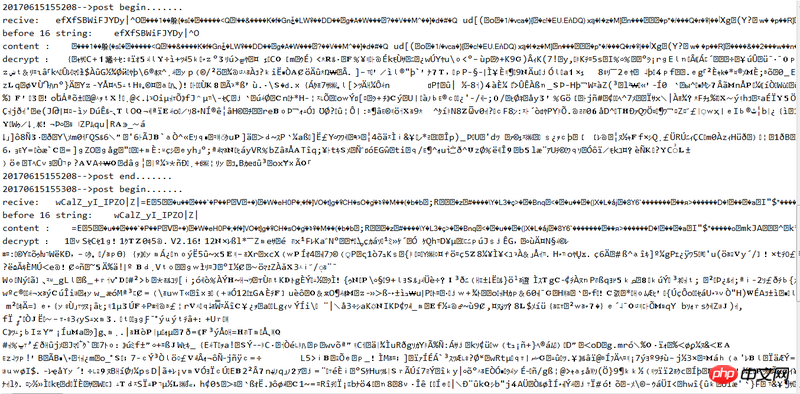Le périphérique sous-jacent est une sonde wifi qui transmet régulièrement les données à un service. Cette adresse de service reçoit les données et utilise rc4 pour les déchiffrer.
Le cryptage rc4 du périphérique sous-jacent est écrit en langage C.
récepteur Java
@RequestMapping("/acc")
public void acc1(HttpServletRequest request,HttpServletResponse response) throws Exception{
SimpleDateFormat sdf = new SimpleDateFormat("yyyyMMddHHmmss");
System.out.println(sdf.format(new Date())+"-->post begin.......");
BufferedReader reader = new BufferedReader(
new InputStreamReader(request.getInputStream(),"UTF-8"));
String line=null;
StringBuilder buffer = new StringBuilder();
while((line = reader.readLine())!=null){
buffer.append(line);
}
System.out.println("recive: "+buffer.toString());
String key = buffer.toString().substring(0, 16);
String content = buffer.toString().substring(16);
System.out.println("before 16 string: "+key);
System.out.println("content : "+content);
System.out.println("decrypt : "+RC4.HloveyRC4(content, key));
System.out.println(sdf.format(new Date())+"-->post end.......");
}
Programme de décryptage Java rc4 :
classe publique RC4 {
public static String HloveyRC4(String aInput,String aKey) {
int[] iS = new int[256];
byte[] iK = new byte[256];
for (int i=0;i<256;i++)
iS[i]=i;
int j = 1;
for (short i= 0;i<256;i++) {
iK[i]=(byte)aKey.charAt((i % aKey.length()));
}
j=0;
for (int i=0;i<255;i++){
j=(j+iS[i]+iK[i]) % 256;
int temp = iS[i];
iS[i]=iS[j];
iS[j]=temp;
}
int i=0; j=0;
char[] iInputChar = aInput.toCharArray();
char[] iOutputChar = new char[iInputChar.length];
for(short x = 0;x<iInputChar.length;x++) {
i = (i+1) % 256;
j = (j+iS[i]) % 256;
int temp = iS[i];
iS[i]=iS[j];
iS[j]=temp;
int t = (iS[i]+(iS[j] % 256)) % 256;
int iY = iS[t];
char iCY = (char)iY;
iOutputChar[x] =(char)( iInputChar[x] ^ iCY) ;
}
return new String(iOutputChar);
} }
Le programme de décryptage php peut décrypter avec succès
$json=file_get_contents('php://input');
if ($json) {
$time_str=date('YmdHms',time());
//开始RC4解密
$key = substr($json,0,16);
$json = rc4($key, substr($json,16));
$json=mb_convert_encoding($json,"UTF-8","auto");
}fonction rc4($pwd, $data)//$pwd key $data doit être une chaîne chiffrée
{
$key[] ="";
$box[] ="";
$cipher="";
$pwd_length = strlen($pwd);
$data_length = strlen($data);
for ($i = 0; $i < 256; $i++)
{
$key[$i] = ord($pwd[$i % $pwd_length]);
$box[$i] = $i;
}
for ($j = $i = 0; $i < 256; $i++)
{
$j = ($j + $box[$i] + $key[$i]) % 256;
$tmp = $box[$i];
$box[$i] = $box[$j];
$box[$j] = $tmp;
}
for ($a = $j = $i = 0; $i < $data_length; $i++)
{
$a = ($a + 1) % 256;
$j = ($j + $box[$a]) % 256;
$tmp = $box[$a];
$box[$a] = $box[$j];
$box[$j] = $tmp;
$k = $box[(($box[$a] + $box[$j]) % 256)];
$cipher .= chr(ord($data[$i]) ^ $k);
}
// var_dump($cipher);
//exit();
return $cipher;}
Les données déchiffrées par la console Java sont tronquées
Pourquoi le décryptage Java échoue-t-il ? J'ai essayé différents codages pour obtenir les données, mais ils étaient tous tronqués après le décryptage.
Ne pouvons-nous pas utiliser le RC4 de JCE pour décrypter ? De plus, les clés des deux côtés sont-elles correctes ?